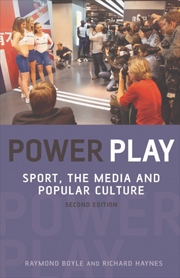Book contents
- Frontmatter
- Contents
- Miscellaneous Frontmatter
- Preface
- Acknowledgements
- 1 Sport, the Media and Popular Culture
- 2 All Our Yesterdays: A History of Media Sport
- 3 A Sporting Triangle: Television, Sport and Sponsorship
- 4 Power Game: Why Sport Matters to Television
- 5 Who Wants to Be a Millionaire? Media Sport and Stardom
- 6 The Race Game: Media Sport, Race and Ethnicity
- 7 Playing the Game: Media Sport and Gender
- 8 Games Across Frontiers: Mediated Sport and National Identity
- 9 The Sports Pages: Journalism and Sport
- 10 Consuming Sport: Fans, Fandom and the Audience
- 11 Conclusion: Sport in the Digital Age
- Bibliography
- Index
11 - Conclusion: Sport in the Digital Age
Published online by Cambridge University Press: 05 August 2013
- Frontmatter
- Contents
- Miscellaneous Frontmatter
- Preface
- Acknowledgements
- 1 Sport, the Media and Popular Culture
- 2 All Our Yesterdays: A History of Media Sport
- 3 A Sporting Triangle: Television, Sport and Sponsorship
- 4 Power Game: Why Sport Matters to Television
- 5 Who Wants to Be a Millionaire? Media Sport and Stardom
- 6 The Race Game: Media Sport, Race and Ethnicity
- 7 Playing the Game: Media Sport and Gender
- 8 Games Across Frontiers: Mediated Sport and National Identity
- 9 The Sports Pages: Journalism and Sport
- 10 Consuming Sport: Fans, Fandom and the Audience
- 11 Conclusion: Sport in the Digital Age
- Bibliography
- Index
Summary
Even though we've left behind the stunning spectacle of Beijing, we know for certain that the Olympics will be one of the biggest themes in British life for the next four years and beyond.
(Roger Mosey, Director of BBC Sport, BBC Sports Editors Blog, 25 August 2008)There is a delight in seeing something well done – and Britain in Beijing was well done. So where next? The lessons for London in 2012 are awesome, and mostly terrifying. The worst lesson is that those seeking money from this government should wrap their demands in the flag, not in reason but in chauvinist shriek, abetted by that grotesque cheerleader, the BBC.
(Simon Jenkins, Guardian, 27 August 2008)Introduction: football is king?
Sport in the twenty-first century is never dull, it cannot afford to be. Sport is but one offering among the global mediated entertainment industries. Press, radio and television are but three possible outlets of sports information and entertainment. Websites, blogs, podcasts, video streams and various forms of mobile content summon the sports fan in an ever increasing array of services. The kind of information and news around sport is also more varied than ever before. In one particular week in September 2008 the news from English football and the extent of its coverage almost beggared belief. First there was the takeover of football club Manchester City by the oversees investment arm of the Abu Dhabi Royal Family.
- Type
- Chapter
- Information
- Power PlaySport, the Media and Popular Culture, pp. 204 - 222Publisher: Edinburgh University PressPrint publication year: 2009



